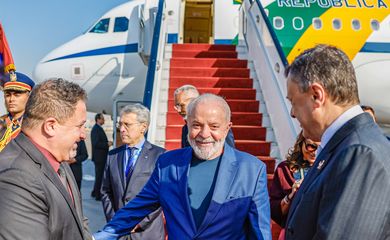Brazil, Egypt ink agriculture, science, tech deals

The governments of Brazil and Egypt signed two bilateral agreements on Thursday to facilitate meat exports and expand cooperation in science and technology. The deals were inked during Brazilian President Luiz Inácio Lula da Silva’s official visit to the African country, when he also proposed raising ties between the two nations to the level of a strategic partnership.

Speaking to the press after the meeting with Egyptian President Abdel Fattah Al-Sisi, President Lula noted that Brazil and Egypt play a key role in their continents and therefore cannot have weak relations. “Our relationship has to be really strong, really big, and involve all possible activities—from agriculture to defense, from the economy to science and technology, from our joint relationship to trying to democratize the functioning of the United Nations, and also in the field of education, in the field of culture,” he declared.
Angola and South Africa are the two African countries with which Brazil harbors a strategic partnership—an in-depth, long-term bilateral relationship with cooperation in areas of interest and political alignment on international issues.
This year, Egypt became a member of the BRICS, a bloc that brings together emerging economies such as Brazil, Russia, India, China, South Africa, Argentina, and Iran. The African country will also join the G20 at the invitation of the Brazilian government which, until December, chairs the bloc of the world’s 20 largest economies.
“We are two large developing countries committed to promoting economic and social development as pillars for peace and security. We combat all manifestations of racism, xenophobia, Islamophobia, and anti-Semitism. Brazil has once again supported the Egyptian initiative to create an arms-free zone in the Middle East, similar to what exists in Latin America,” President Lula pointed out.
“In the BRICS, we will work together to reform the global order and build peace, especially at a time when protectionist pressures and conflicts that penalize the poorest countries are resurfacing,” he added, advocating a discussion on the foreign debt of African countries.
The visit to Cairo also celebrates 100 years of diplomatic relations between Brazil and Egypt. Egypt is currently Brazil’s second largest trading partner in Africa, behind Algeria.
In 2023, bilateral trade between the two nations reached $2.8 billion, with $489 million in Egyptian products imported by Brazil and $1.83 billion in Brazilian products exported. In the case of Algeria, the trade balance amounted to $4.2 billion last year.
The Brazilian government expects trade between the nations to increase in the coming years, following the opening of the Egyptian market to various Brazilian products in 2023, including fish and fish products, poultry, cotton, bananas, gelatine, and collagen. Brazil is also negotiating the authorization of new slaughterhouses and meatpacking plants in Brazil to export beef.
During the assembly, Lula also proposed the negotiation of a cooperation and investment facilitation agreement to boost business integration. The opening of an air route linking São Paulo to Cairo was also discussed.
Exports
Among the official documents, a protocol for the export of meat and meat products from Brazil to Egypt was signed between the African country’s Ministry of Agriculture and Land Reclamation and the Brazilian Ministry of Agriculture and Livestock. According to the government, the move “guarantees food safety and strict quality standards and removes bureaucratic restrictions on the export of beef, pork, and poultry.”
Egypt is one of the world’s six largest importers of Brazilian beef and a leading importer of poultry.
The protocol creates an equivalence of meat inspection systems, also known as pre-listing. It reflects the high degree of confidence in Brazilian sanitary control, especially in the Federal Inspection Service, which has come to be recognized by more than 150 importing countries.
Prior to this accord, the renewal of Brazilian establishments’ export licenses required face-to-face audits by the Egyptian authorities. The procedure involved high costs for exporters, overburdened auditors and limited the number of businesses allowed to export.
Some 30 Brazilian establishments had been on the waiting list for authorization since 2019. Now, companies certified by Brazil will be automatically recognized by Egypt, which has the right to visit establishments whenever it deems appropriate to verify compliance.
Science and technology
During President Lula’s visit, a memorandum was also signed reinforcing partnerships, cooperation, and research in science, technology, and innovation between the two countries. The document is between Egypt’s Ministry of Higher Education and Scientific Research and Brazil’s Ministry of Science, Technology, and Innovation.
The text aims to encourage collaboration between companies, universities, and research institutes, including joint research, development, and innovation projects, staff exchange, and seminars.




